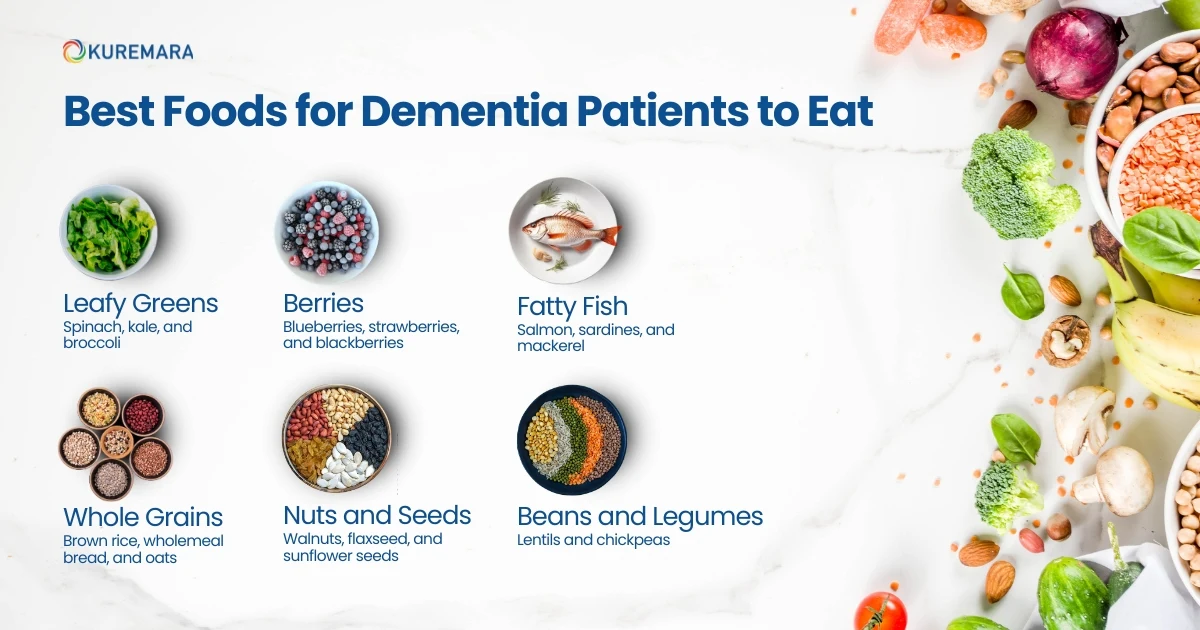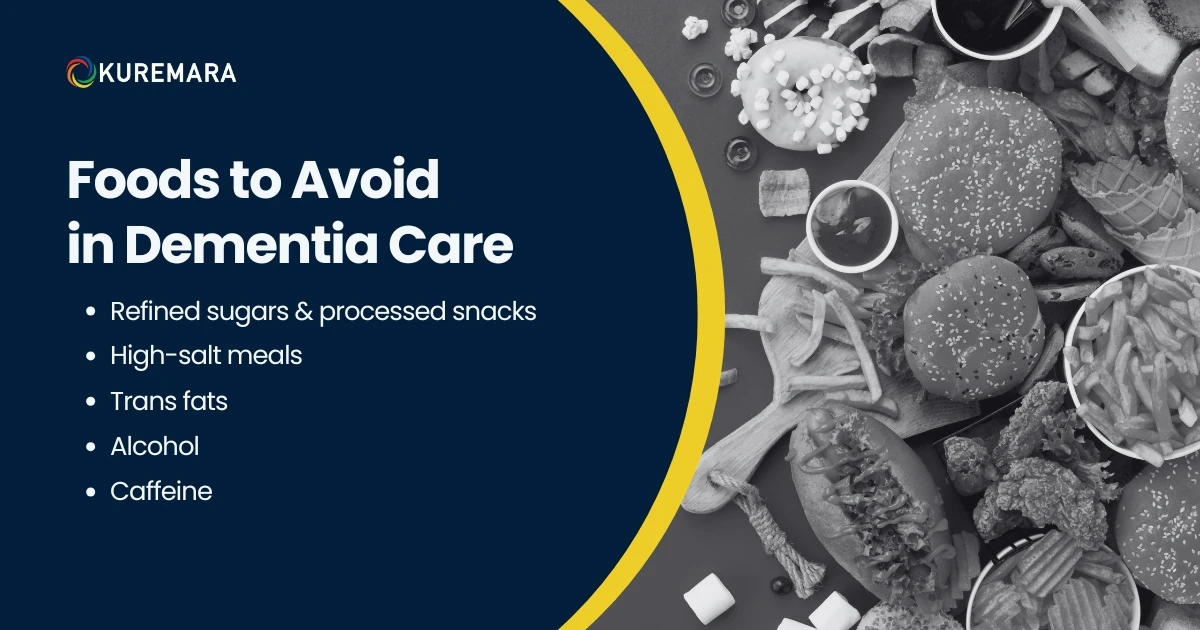
When a loved one is living with dementia, even the simplest daily routines can feel overwhelming, especially mealtimes. Families often ask: What are the best foods for dementia patients to eat? Which foods should we avoid? And how can we make mealtimes easier?
Nutrition plays a significant role in maintaining brain health and quality of life. At Kuremara UK, a CQC-registered organisation offering domiciliary and home care support services across the United Kingdom, we believe that small, thoughtful choices in diet and dining can make a big difference in the wellbeing of those living with dementia.
The Connection Between Food and Dementia
Research has consistently shown that diet can influence cognitive health. According to the World Health Organization (2023), up to 40% of dementia cases may be preventable or delayed by lifestyle factors, including diet. A balanced dementia diet supports memory, mood, and energy levels while also reducing risks associated with cardiovascular health, which is closely linked to brain function.
Nutrients such as omega-3 fatty acids, antioxidants, vitamins B, and fibre help maintain neural connections and promote better brain performance. Just as importantly, food provides comfort and routine, two elements that can significantly ease the anxiety that often accompanies dementia.
Best Foods for Dementia Patients to Eat

Choosing the right food for dementia care doesn’t need to be complicated. Think of it as a brain-boosting, heart-healthy diet that also respects your loved one’s preferences.
Here are some of the best foods for dementia patients to eat:
1. Leafy Greens
Vegetables like spinach, kale, and broccoli are packed with vitamin K, lutein, and folate. Studies in 2022 linked higher consumption of greens to a slower rate of cognitive decline.
2. Berries
Blueberries, strawberries, and blackberries are rich in flavonoids—antioxidants proven to improve memory. Research shows people who eat berries regularly may delay memory decline by up to 2.5 years.
3. Fatty Fish
Salmon, sardines, and mackerel are excellent sources of omega-3 fatty acids. These help protect against inflammation and are linked to lower risks of cognitive decline.
4. Whole Grains
Brown rice, wholemeal bread, and oats stabilise blood sugar levels and provide long-lasting energy, which supports focus and reduces fatigue.
5. Nuts and Seeds
Walnuts, flaxseed, and sunflower seeds supply healthy oils and vitamin E, which is associated with reduced risk of Alzheimer’s progression.
6. Beans and Legumes
Lentils and chickpeas are high in fibre and protein, keeping meals satisfying while supporting overall heart and brain health.
This type of balanced approach, similar to the Mediterranean-style diet, has been recommended by NHS guidelines as one of the best diets to avoid dementia.
Foods to Avoid in Dementia Care

Just as important as choosing nourishing foods is knowing which to limit.
- Refined sugars & processed snacks: cause spikes in energy and agitation.
- High-salt meals: linked with hypertension, which can increase dementia risk.
- Trans fats: often found in fried foods and margarine; harmful for heart and brain health.
- Alcohol: excessive intake is associated with memory impairment.
- Caffeine: when consumed in large amounts, it can disrupt sleep, a common difficulty for dementia patients.
While complete restriction isn’t always realistic, reducing these items helps create a diet to avoid dementia complications.
Making Mealtimes Dementia-Friendly

For people with dementia, the dining experience can be as important as the food itself. Practical changes to the mealtime environment often encourage better nutrition.
- Create a calm environment: reduce distractions like loud TV or clutter.
- Use adaptive tools: easy-grip utensils and spill-proof cups can help maintain independence.
- Offer familiar foods: comfort meals often encourage better appetite.
- Plate presentation matters: using high-contrast plates improves visibility and reduces confusion.
- Stick to routines: regular mealtimes help reduce anxiety and improve consistency.
Aged Care research (2023) highlights that mealtime routines can reduce behavioural symptoms of dementia by up to 30%, reinforcing how vital consistency is in everyday care.
Recognising When to Seek Help
Changes in appetite, weight, swallowing, or behaviour may signal a need for professional input.
- Doctors and dietitians for medical and nutritional advice.
- Dentists for oral health checks.
- Speech pathologists for swallowing difficulties.
- Occupational therapists for mealtime equipment and seating.
Regular assessments ensure mealtime strategies evolve with the person’s changing needs.
Practical Tips for Families and Carers
Supporting your loved one with dementia through food involves patience and creativity. Here are some practical strategies:
- Opt for small, frequent meals if large plates feel overwhelming.
- Prioritise hydration through water bottles, soups, and fruit-infused water. Dehydration is common among dementia patients and can worsen confusion.
- Focus on safe textures: mash or chop foods for easier swallowing where necessary.
- Involve your loved one in simple tasks like stirring or choosing ingredients, which can boost mood and engagement.
- Respect cultural and personal food preferences, familiar flavours often encourage better eating habits.
How Kuremara UK Supports Dementia-Friendly Diets
At Kuremara UK, we understand that good nutrition is central to dementia care. Our CQC-registered carers provide support that goes beyond meal preparation, they offer companionship, dignity, and reassurance.
- Tailored meal plans based on medical needs and family preferences.
- Assistance with grocery shopping, cooking, and safe feeding.
- Support for independence: encouraging participation while ensuring safety.
- Close collaboration with families to ensure dietary needs are met with compassion.
We know every individual is different, which is why our home care services are personalised. Whether you’re exploring visiting care or live-in support, our team is here to help your loved one enjoy mealtimes with comfort and dignity.
Conclusion
Food is far more than nourishment, it is a source of comfort, identity, and wellbeing. By focusing on foods to prevent dementia while limiting harmful choices, families can make a powerful difference in the daily lives of loved ones with dementia.
At Kuremara UK, we believe that mealtimes should be moments of joy, not stress. Through our compassionate domiciliary and home care services, we help families navigate the complexities of dementia diets with practical support and expertise.
With the right guidance, patience, and care, making dementia-friendly food choices can be simpler than you think. And you don’t have to do it alone, our dedicated carers are here to ensure your loved one receives the support they deserve, every day



